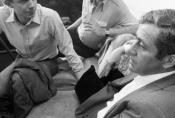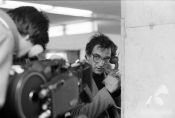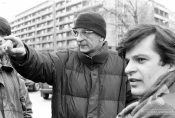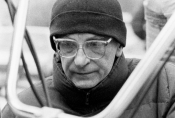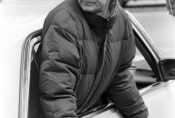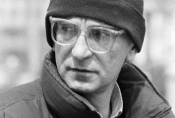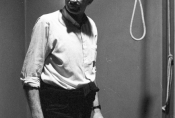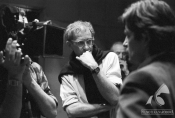Krzysztof Kieślowski
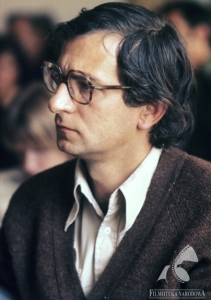
Film, theatre and television director, writer and educator. Born on June 27 1941 in Warsaw, died on 13 March 1996 in Warsaw. In the years 1957-1962, he attended the High School for Theatre Technology, and then worked as a dresser at the Współczesny Theatre in Warsaw. He graduated from the Directing Department of the State School of Theatre and Film (1968, diploma in 1970). The title of his thesis, written under the supervision of Jerzy Bossak, was: Documentary Film and Reality. This theoretical work was complemented by two short films: Zdjęcie/Photograph (1968) and Z miasta Łodzi/From the City of Łódź (1969). The former was a kind of documentary investigation – the author presented an old photograph of two boys holding guns, and then found them and recorded their current emotions on camera; the second film was a patient observation of the everyday life of the workers of Łódź. Kieślowski shot Z miasta Łodzi/From the City of Łódź at the Documentary Film Studio in Warsaw, where he made all his documentary films, with one exception – Byłem żołnierzem/I Was a Soldier (1970), made jointly with Andrzej Titkow, a colleague from film school, in the Warsaw “Czołówka” Film Studio. For Z miasta Łodzi/From the City of Łódź, Kieślowski visited Łódź textile factories with his camera, a year later – in his Fabryka/Factory (1970) – he brought it to the Warsaw Ursus Mechanical Works, juxtaposing the production conference with the difficult working conditions. Kieślowski addressed the growing gap between propaganda and reality, both accompanying the protagonists of his documentaries every day like in his film Robotnicy 1971: Nic o nas bez nas/Workers 1971: Nothing About Us Without Us (1972), made together with Tomasz Zygadło, Wojciech Wiszniewski, Pawel Kedzierski and Tadeusz Walendowski, which provoked a firm reaction from the censor and party authorities (a shorter cut, edited at their insistence, is entitled Gospodarze/Hosts). Incidentally, Kieślowski addressed the gap between propaganda and actual reality nearly twenty years later in Dworzec/Railway Station (1980), a documentary about Warsaw Central Railway Station – the flagship investment of the Gierek decade. Over the years, the themes of his films also evolved: from descriptions of the surroundings and the external reality, he shifted his focus towards people, first watching them in a wider context, usually among their work colleagues, eventually directing the camera lens at an individual, and actually his or her internal life. Kieślowski’s Murarz/Bricklayer (1972) – a portrait of a Warsaw worker – that had to wait nine years for its premiere, was shot in a single day, on May 1, 1972. The hero of Życiorys/Curriculum Vitae filmed three years later (Brown Lajkonik award in Kraków) was an engineer, Antoni Gralak, who believed that the distortions in our system of government can be eliminated. His medium-length documentary Nie wiem/I do not know (1977) also has a biographical narrative structure. The main character talks about his life, full of dramatic turns. Kieślowski’s films not only watched the dark side of contemporary reality, they were also a warning. One such severe warning is undoubtedly the documentary Z punktu widzenia nocnego portiera/From a Night Porter's Point of View (1977, Golden Lajkonik in Kraków), in which the director draws an uncompromising portrait of a fanatical supporter of order and all manner of control, a model representative of the totalitarian state.
Kieślowski's documentary oeuvre includes films that are not involved in the surrounding social and political reality, but which focus on an individual in an existential sense. One such document is Pierwsza miłość/The First Love (1974, Golden Lajkonik in Kraków), a story about two young people who – although they are only seventeen, eighteen and are still at school – expect their child to be born. Siedem kobiet w różnym wieku/Seven Women of Different Ages (1978, Golden Lajkonik in Kraków) is a beautiful poetic tale about passing, in which human existence is shown through the stories of seven ballerinas – from a very young pupil to a retiree. Kieślowski's oeuvre is best summarised by the documentary Gadające głowy/Talking Heads (1980), in which people of different ages and different professions answer the same questions: who they are and what they want. When the director asks the last interlocutor, born in 1880 and so one hundred years at the time of the recording, "What do you want?" she replies immediately: "I would like to live longer. Live longer."
After Gadające głowy/Talking Heads, Krzysztof Kieślowski turned exclusively to feature films, which he had been making since the beginning of his career in parallel with the documentaries: in 1966, he directed a student film Tramwaj/Tram, a year later – Koncert życzeń/Wishing Concert, in 1973 – a TV film Przejście podziemne/Underpass, and two years later – Personel (Award in Mannheim and Gdansk). In 1976, he made his debut feature film for cinema, Blizna/The Scar (Special Award in Gdańsk), a para-documentary story about a director in charge of the construction of a large chemical factory which is being built as a result of a political decision, against all common sense and in a completely unsuitable place. His next film, Amator/Camera Buff (1979), was critically acclaimed in the East and the West, winning awards in West Berlin, Chicago, Moscow and Gdansk. When Filip, a 30-year-old driver, becomes a father to a daughter, he buys a camera. From that moment on, he is completely consumed by filming. This flagship work of the cinema of moral anxiety ends with the haunting scene of Filip recording everything around him with his camera and suddenly pointing the lens at himself ... Przypadek/Blind Chance (1981, awards in Gdynia and Moscow) was sent by the censor back to “the shelf” instead of the screens, only to be released six years later. It is more of a philosophical essay than a narrative story in the strict sense. The fate of Witek, the hero of Kieślowski’s film, depends on blind chance: whether he catches the train on time one day, gets involved in a fight with the Railway Protection Service officers, or stays on the platform. In the first variant of the story he becomes a youth activist, in the second – an oppositionist, in the third – a politically uninvolved scholar. Bez końca/No End (1984) is set during the martial law era. The day after his own funeral, lawyer Antoni Zyro returns to his home; from now on, he will accompany the living, sometimes interfering in their lives. It was the first film made by the trio comprising of Krzysztof Kieślowski, Krzysztof Piesiewicz and Zbigniew Preisner. Their next monumental undertaking was the TV series Dekalog/The Decalogue (1988, awards in Montreal, San Sebastian, Sao Paulo, Venice), two episodes of which also had longer, cinematic versions: Krótki film o zabijaniu/A Short Film About Killing (1987 European Film Award, and awards in Cannes and Gdynia), inspired by the fifth commandment, which perfectly fit discussions on the usefulness and effectiveness of the death penalty, and Krótki film o miłości/A Short Film About Love (1988, award in San Sebastian, Geneva, Sao Paulo, Strasbourg, Gdynia), a subtle variation on the sixth commandment “You shall not commit adultery”. Podwójne życie Weroniki/The Double Life of Veronique (1991, awards in Cannes, Golden Duck, Golden Ribbon) is the first film of Kieślowski filmed in co-production with the French film industry. This moving story about love, life and death has two protagonists – Véronique and Weronika. One lives in France, the other in Poland. Both are talented musically, both also have a heart condition ... The triptych Trzy kolory/Three Colours was a Franco-Swiss-Polish co-production. Inspired by the colours of the French flag, it turned out to be quite an unconventional attempt to contribute to the debate on the revolutionary ideas of equality, liberty and fraternity. The heroine of Niebieski/Blue (1993, awards in Venice, Golden Duck) loses her husband and daughter in a car accident. She begins to live a new life, anonymous and independent... The protagonist of Biały/White (1994, award in Berlin) is forced to divorce his wife. At the same time, he loses his job and his home and succumbs to misery. Quite accidentally, however, he manages to recover, he wins a fortune and decides to get back at his ex-wife ... and finally Czerwony/Red (1994, Oscar nominations for the best director and original screenplay). An old, bitter retired judge is holed up in his home near Geneva. He is trying to spice up his loneliness by eavesdropping on telephone conversations. Suddenly, a young, pretty girl enters his life...
In an interview with Stanisław Zawiśliński, biographer and expert on Kieślowski, the director said, "Everyone wants to change the world, when he starts to do something. I guess I did not expect that I could change the world in the literal sense of the word. I thought I could describe this world.” And it worked. Not only the external aspect, but also internal. He began his career as a documentary filmmaker, and he remained one – despite all his contributions to feature films – until the very end. Documenting human nature.
He received the Award of the Minister of Foreign Affairs for the promotion of Polish culture abroad (1989), the Order of Arts and Literature, awarded by the Minister of Culture of France (1993), the Danish CJ Soning award for his contribution to the development of film art and European culture (1994) and many other prestigious honours.
Jerzy Armata
Selected filmography
-
1979
CAMERA BUFF
-
1981
BLIND CHANCE
-
1987
A SHORT FILM ABOUT KILLING
-
1988
A SHORT FILM ABOUT LOVE
Articles
-
Head of Medusa, or realism in films of the Cinema of Moral Anxiety
Marcin Maron
„Kwartalnik Filmowy” – Special Issue 2013: “Polish Film Scholars on Polish Cinema”
-
Accidental Life Changes. Following Krzysztof Kieślowski
Jacek Bolewski
Świat według Kieślowskiego/The World According to Kieślowski, Editor: Barbara Kurowska, Publisher: Muzeum Kinematografii w Łodzi, 2011
-
Krzysztof Kieślowski: Je t’aime… Moi non plus
Grażyna Arata
Świat według Kieślowskiego/The World According to Kieślowski, Editor: Barbara Kurowska, Publisher: Muzeum Kinematografii w Łodzi, 2011

